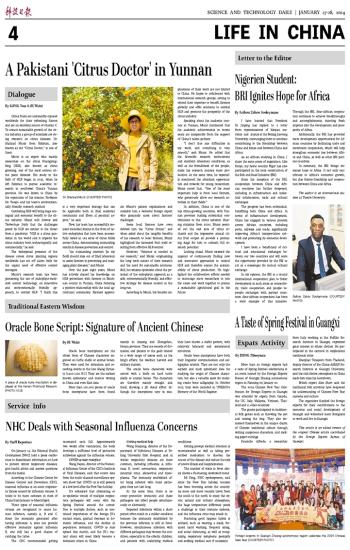
On January 14, the National Health Commission (NHC) held a press conference to disseminate information on how to prevent winter respiratory diseases, give health advice and answer questions from the media.
According to the Chinese Center for Disease Control and Prevention (CDC), seasonal influenza is an acute respiratory illness caused by influenza viruses. It tends to be more common in most of China from January to March/April.
Three types of seasonal influenza viruses are recognized to cause human infection, namely A, B and C. Since the immunity generated after having influenza A does not provide effective immunity against influenza B, one still has a good chance of catching the latter.
The CDC recommended getting vaccinated each fall. Approximately two weeks after vaccination, the body develops a sufficient level of protective antibodies against the influenza viruses.
COVID-19 may resurface
Wang Dayan, director of the National Influenza Center of the CDC's Institute of Viral Diseases, said that recent data from the multi-channel surveillance system show that COVID-19 is still present at a low level after the New Year holiday.
It's estimated that alternating or co-epidemic trends of multiple respiratory pathogens will occur with the Spring Festival around the corner. Due to multiple factors, such as continued importation of the foreign JN.1 mutant strain, gradual decrease in domestic influenza, and the decline in population immunity, COVID-19 may spread this month, and the JN.1 mutant strain will most likely become a dominant strain in China.
Getting medical help
Wang Guiqiang, director of the Department of Infectious Diseases at Peking University First Hospital, said in winter respiratory diseases are more common, including influenza A, influenza B, novel coronavirus, respiratory syncytial virus, adenovirus and mycoplasma. The immunity established after being infected with these pathogens does not last long.
At the same time, there is no cross-protective immunity and these pathogens can infect people simultaneously or alternately.
Repeated infections within a short period often result in a milder condition because the immunity established by the previous infection is still in force. However, simultaneous infection with different pathogens may worsen the condition, especially in the elderly, children, and patients with underlying medical conditions.
Getting prompt medical attention is recommended as well as taking prescribed medication to shorten the course of the disease and reduce the risk of severe illness and hospitalization.
The number of visits to fever clinics shows a fluctuating downward trend.
Mi Feng, NHC spokesperson, said since the New Year holiday, tourism has been booming across the country. As more and more tourists travel from the south to the north to enjoy the exotic natural and cultural atmosphere, the huge temperature difference poses a challenge to their immune systems, and the influenza virus may sneak in.
Practicing good hygiene habits is advised, such as wearing a mask, frequent hand washing, frequent airing, and social distancing, as well as recognizing respiratory symptoms promptly and seeking medical care if necessary.







